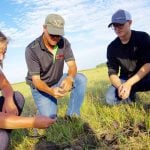Two University of Manitoba researchers think they see the smoking gun that reveals that corporate money is killing independent research about farming.
But the university says the smoke is from friction created by the researchers who used research money to make a video documentary without sorting through legal implications first.
“Their actions have prevented the release of the video,” said researcher Stephane McLachlan about the university’s reaction to his film Seeds of Change, which records farmers and commentators’ views about the impact of genetically modified crops.
Read Also

Farmland ownership fires up Saskatchewan politicians
Saskatchewan politicians debate the enforcement of farmland ownership laws in the province.
He and graduate student Ian Mauro said their documentary, shot in 2002, is fair.
“It’s not anti-GM crop at all … but it expresses some of the problems around this new technology.”
He said he suspected the university has tried to block the documentary’s release because it does not want to anger Monsanto, which conducts research on campus and recently decided to build a new research centre there.
“I think (the problems) very much have to do with the content and the perspectives reflected in the video,” said McLachlan.
University of Manitoba vice-president of research Joanne Keselman said the problems with the documentary are not about its content. The university has tried to reach a deal with the researchers to allow them to use the raw video footage they produced as part of a university-backed project, but the researchers have created a complicated situation.
“I think the university has diligently and conscientiously and consistently tried to move this project forward,” said Keselman.
“The project has, I think, been changed along the way by the faculty member and the graduate student and they have had some different ideas about how they wanted to use the raw footage.”
Keselman said problems arose because the video footage was produced as part of a research project that was not originally intended to become part of a widely released film. The university has strict rules governing the use of material from subjects who are involved in research studies, such as the farmers interviewed for the film.
The researchers also complicated matters by transferring their rights to material, which is shared with the university, to a private production company outside the university, in which they are shareholders and which also involves non-university people.
Sorting out each party’s legal rights and obligations has been difficult.
Mauro said the farmers interviewed have given their permission to appear in the film and he believes the university’s concerns about rights is a way to block the film from appearing.
“There is a deep rot inside the University of Manitoba and there is a deep rot that should make the farm community, the research community and society as a whole very concerned about what is going on at this university,” said Mauro.
Monsanto spokesperson Trish Jordan said her company has not expressed concerns about the film because it has never seen it and didn’t realize there was a dispute until the researchers publicly condemned the university.
Monsanto is frequently referred to in the film, Mauro said, but Jordan said the company was not asked to participate in it.
Keselman said the university has strong safeguards that stop non-university interests from interfering with university research and its only concerns with Seeds of Change has been “about how to transfer to an outside private company for the purposes of distributing the Seeds of Change video either for commercial or educational purposes.”















